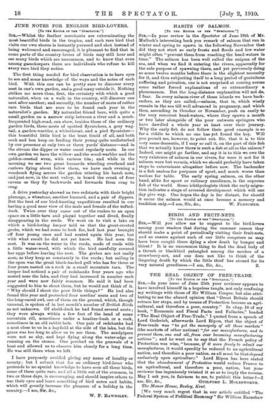HABITS OF SALMON.
[To THE EDITOR OF THE "13PBOTATOB."] Sra,—In your review in the Spectator of June 18th of Mr. Malloch's interesting book you remark of salmon that run in winter and spring to spawn in the following November that did they not start so early frosts and floods and low water might often " prevent them from reaching the head-waters in time." The salmon has been well called the enigma of the sea, and when we find it entering the rivers, apparently for the sole purpose of spawning there, and yet perversely doing so some twelve months before there is the slightest necessity for it, and thus subjecting itself to a long period of gratuitous suffering and privation, one is not surprised at coming across some rather forced explanations of so extraordinary a phenomenon. But the long-distance explanation will not do, I fear. In every salmon-river of these islands we have back- enders, as they are called,—salmon, that is, which wisely remain in the sea till well advanced in pregnancy, and which then, ascending in October or November, push on easily to the very remotest head-waters, where they spawn a month or two later alongside of the poor outworn springers who have dawdled a whole year at least over their journey. Why the early fish do not follow their good example is so far a riddle to which no one has yet found the key. Will you permit me, however, to point out. Sir, that it is to this very same dementia, if I may so call it, on the part of this fish that we actually know there is such a fish at all as the salmon ? Indeed, one might go farther, and say it is to this we owe the very existence of salmon in our rivers, for were it not for it salmon were but vermin, which we should probably have taken steps to exterminate altogether before now. The laackender is a fish useless for purposes of sport, and much worse than useless for table. The early spring salmon, on the other hand, alike for sport or culinary excellence, is the supreme fish of the world. Some ichthyologists think the early migra- tion indicates a stage of arrested development which will one day give way. One hopes the day is far distant, for should it occur the salmon would at once become a memory and
tradition only.—I am, Sir, &c., W. FLETCHER.


















































 Previous page
Previous page